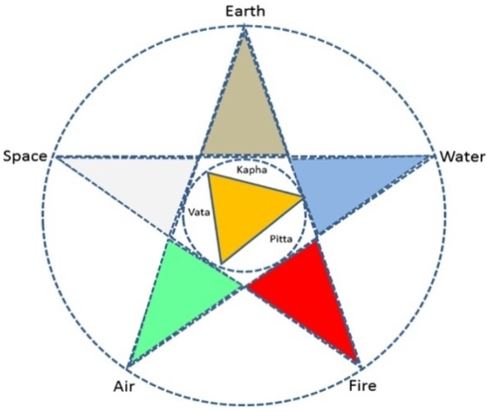Efficacy of Ayurveda in the Prevention of Lifestyle Diseases or Non-Communicable Diseases (NCDs)
DOI:
https://doi.org/10.21760/jaims.9.8.18Keywords:
Ayurveda, Health, lifestyle, eating habits, functional foodsAbstract
Lifestyle diseases occur due to an individual's everyday regimen and arise from an incorrect interaction between individuals and their environment. Bad eating habits, physical inactivity and a disrupted biological clock are primarily responsible for such diseases. In this context Ayurveda offers a well-organized system of conventional health care that promotes health maintenance and disease prevention via adherence to a balanced diet and vigorous lifestyle. There has been a strong connection between Ayurveda and Nutrition since ancient times. Interest in Ayurveda has grown across the globe due to its potential for managing and preventing lifestyle disorders. Acknowledged as one of the leading life sciences Ayurveda offers effective solution through Panchakarma, Rasayana, dietary control, lifestyle advice and rejuvenating therapies. The most effective and significant method in use is Ashtanga Yoga, a combination of Yogic and meditation exercises beneficial for regulating one's senses, focus and combating lifestyle disorders. Thus, Ayurveda is a holistic approach to health designed to help people live long, healthy and balanced life free from illness and diseases. This paper examines the causative factor behind certain lifestyle diseases and lays stress on their prevention through Ayurvedic techniques.
Downloads
References
Sharma, H. M., Clark, C., & Micozzi, M. S. (2011). Ayurvedic healing: Contemporary maharishi Ayurveda medicine and science. Singing Dragon.
Chauhan, A., Semwal, D. K., Mishra, S. P., & Semwal, R. B. (2015). Ayurvedic research and methodology: Present status and future strategies. AYU (An International Quarterly Journal of Research in Ayurveda), 36(4), 364-369.
Bhatt, K. L., & Khader, A. (2020). Conceptual and clinical approach of Immunology in Ayurveda. Journal of Ayurveda and Integrated Medical Sciences, 5(04), 164-168.
Gupta, D., Agrawal, S. K., & Sharma, V. K. K. (2023). An Analytical Study to Evaluate the Safety of Prayogika Dhumapana in Dinacharya. AYUHOM, 10(2), 104-109.
Banamali, D. (2014). Concept of dietetics and its importance in Ayurveda. J Homeop Ayurv Med, 3(149), 2167-1206.
Nagar, D., Sharma, R., & Nagar, J. (2019). Role of Ayurveda In Public Health: A Review Article. World Journal of Pharmaceutical Research, 649-653.
Nikam, M. U. (2023). Lifestyle Diseases and Ayurveda1. ON RESEARCH IN.
Khan, I. A., Baranwal, K., Joshi, H. S., & Sharma, P. (2021). Prevention and management of chronic non-communicable diseases (NCD) with integrated Modern and Ayurvedic principles. Indian Journal of Preventive & Social Medicine, 52(1), 55-61.
Jha, M., Sah, M. K., Singh, P. K., & Kumar, A. (2021). Role of Ayurveda in Public Health: A Critical Review. International Journal of Research in AYUSH and Pharmaceutical Sciences, 595-599.
Singh, S. (2018). Importance of Ayurveda in Prevention of Lifestyle diseases.
Mukherjee, P. K., Harwansh, R. K., Bahadur, S., Banerjee, S., Kar, A., Chanda, J., ... & Katiyar, C. K. (2017). Development of Ayurveda–tradition to trend. Journal of ethnopharmacology, 197, 10-24.
Nikam, J. (2018) Opportunities in Yoga Education.
Navale, R. S., & Gaikwad, A. (2023). CONCEPTUAL STUDY OF AYURVEDA AS PREVENTION IN COMMUNICABLE DISEASES.
Chakraborty, (2023) T. AYURVEDA-THE WAY OF SUSTAINABLE HEALTH CARE.
Sahu, D., Bhushan, S., Das, D., Debnath, S. K., Barik, L., Meena, V., ... & Prasad, P. V. V. (2021). Potential Ayurvedic herbs for neurodegenerative diseases: A review. Research journal of Pharmacology and Pharmacodynamics, 13(2), 69-74.
Patnaik, S. (2023). ROLE OF AYURVEDA IN PUBLIC HEALTH.
Saini, M., Kumar, A. S., & Kumar, S. K. (2021). A Randomized Controlled Trial to Assess the Effect of Pathya Ahara in Grahani. Journal of Ayurveda, 15(1), 14-18.
Arun G Nair, & Roopa Bhat. (2023). Management of Vataja Grahani with Takra Basti - A Case Study. AYUSHDHARA, 10(3), 77-81. https://doi.org/10.47070/ayushdhara.v10i3.1265
Samal, J. (2013). The concept of public health in Ayurveda. International Ayurvedic Medical Journal, 1(2), 1-5.
Maurya, N., Ram, M., Jaiswal, R. N. T., & Saxena, A. (2024). Preventive health care and life style management. Journal of Ayurveda and Integrated Medical Sciences, 9(1), 122-131.
Chimankar, R. P., Tawalare, K. A., & Mishra, S. A. (2020). Prevention of lifestyle disorders with basic principles of ayurveda. International Ayurvedic Medical Journal,(Online), 4487-4492.
Gupta, D., Agrawal, S. K., & Sharma, V. K. K. (2023). An Analytical Study to Evaluate the Safety of Prayogika Dhumapana in Dinacharya. AYUHOM, 10(2), 104-109.
Pujari, S., Mamatha, K. V., Goud, K. M., & Mishra, B. (2014). Role of Dhumapana (nebulization) and pana with ardraka arka in the management of tamaka shwasa. Ayushdhara, 1, 43-9.
Kumari, S. (2021). A survey report on status of Bala (Physical strength) and Agni (Digestive Strength) during Greeshma Ritu (summer season). Journal of Ayurveda and Integrated Medical Sciences, 6(4), 85-88.
Nathani, N., Samaria, J. K., & Tiwari, S. K. (2014). EVALUATION OF THE EFFECT OF RITUCHARYA ON SPIROMETRIC PARAMETERS IN PATIENTS OF BRONCHIAL ASTHMA. International Journal of Medicine and Pharmaceutical Sciences (IJMPS), 4, 111-118.
Choudhary, S. T., Bobade, R., & Firke, A. (2023). AYURVEDA AND PUBLIC HEALTH.
Nikam, M. U. (2023). Lifestyle Diseases and Ayurveda1. ON RESEARCH IN.
Bhaskaran, J. K., & Pansi, (2018) S. JOURNAL OF RESEARCH IN TRADITIONAL MEDICINE.
Giri, N., Joshi, A., & Srivastava, N. (2023). DOSHAJ PRAKRITI IN AYURVEDA AND ITS CORRELATION WITH BODY MASS INDEX (BMI).
fpubh-04-00057-g001.jpg (669×578) (frontiersin.org
Sharma, K. K., Bhatt, A., Dhaked, P., Sharma, A. K., Sharma, A., & Vairagi, S. (2022). ROLE OF YOGA AND AYURVEDA IN PREVENTION OF NON-COMMUNICABLE DISEASE.
Verma, Kanika; Singh, Deepeshwar; Srivastava, Alok1. Comparative impact of yoga and ayurveda practice in insomnia: A randomized controlled trial. Journal of Education and Health Promotion 12(1):160, May 2023. | DOI: 10.4103/jehp.jehp_1489_22
Shriya, S., Sahana, A. U., & Singh, B. (2022). The Effect of 3-week’s Yoga therapy program on clinical outcomes in patients with Parkinson’s disease. Journal of Ayurveda and Integrated Medical Sciences, 7(10), 60-66.
Lim, S. A., & Cheong, K. J. (2015). Regular yoga practice improves antioxidant status, immune function, and stress hormone releases in young healthy people: a randomized, double-blind, controlled pilot study. The Journal of Alternative and Complementary Medicine, 21(9), 530-538.















